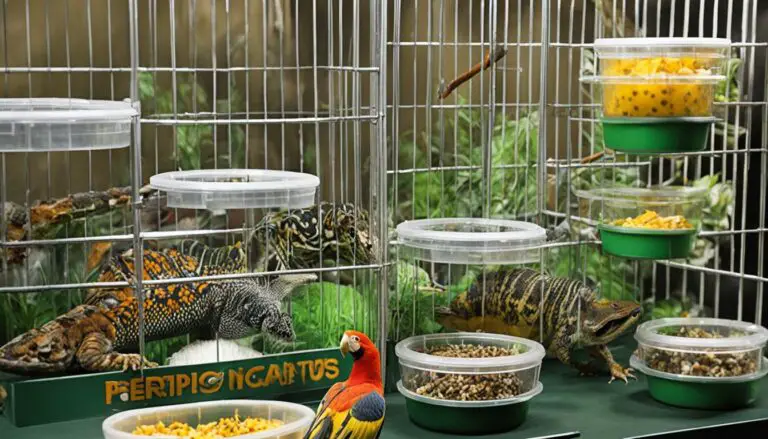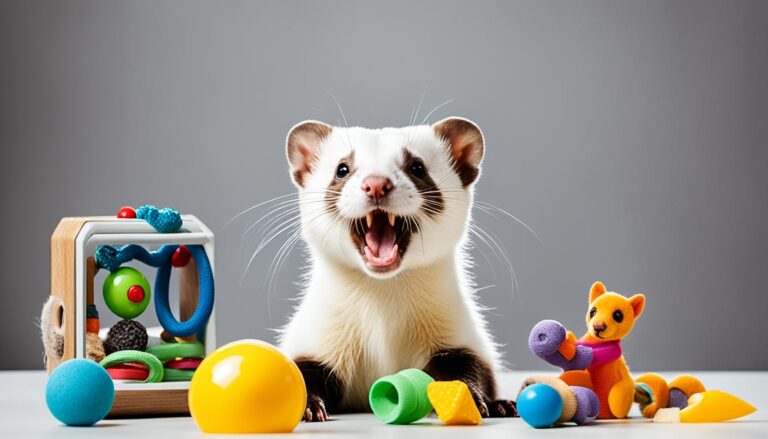Exotic Pet Owner Educational Resources Guide
Did you know over 7 million households in the U.S. have exotic pets?
For those who own or think of owning a unique pet, finding good info is vital. No matter your experience level, it’s important to have access to trusted advice. Luckily, many resources exist to guide you in caring for these special animals.
Key Takeaways:
- Education is key to responsible exotic pet ownership
- There are over 7 million households in the United States that own exotic pets
- Access to educational resources can help you provide the best care for your unique companion
- Exotic pet care tips, health guides, and legal advice are valuable resources to consider
- Remember that owning an exotic pet is a lifelong commitment that requires ongoing education, dedication, and love
Understanding Exotic Pets
Exotic pets include a variety of species with special traits and needs. This ranges from colorful reptiles to unique birds and mammals. Ensuring your exotic pet’s specific needs are met is vital.
Owners need to be well-informed to take good care of their unique pets. These pets are not your usual cat or dog. They need special care, and it’s key to know what they require.
Why are educational resources important for exotic pet owners?
Learning materials are essential for exotic pet enthusiasts. They help make informed choices about the care of their pets. These materials include details on healthcare, nutrition, and the type of spaces they need.
- Healthcare and veterinary support for exotic pets
- Proper nutrition for various exotic species
- Behavioral traits and enrichment activities
- The importance of creating a suitable environment
- Legal considerations and responsible ownership
Such resources guide pet owners in providing the best care. They focus on not just the basics, but also on being a skilled and caring owner. This helps make the pet’s life better.
“Educational resources are key for us exotic pet owners. They give us info on our pet’s complex needs and how to take good care of them.”
With these materials, pet owners learn how to care for their pets responsibly. They also connect with others who are passionate about exotic pet welfare.

Accessing information about exotic pet care helps owners provide a happy life for their pets. It equips them with the knowledge needed for fulfilling pet ownership.
Researching Your Chosen Exotic Pet
Before you get an exotic pet, do your homework well. You need to understand what each type of animal needs. They differ in what they eat, where they live, and who they socialize with. Knowing these details is key to being a good exotic pet owner.
Start by learning about how to take care of exotic pets. Knowing what each kind needs helps you give them a happy home. You might find beginner guides very helpful. They cover all the basics you need to know.
But just having a nice place for them isn’t enough. It takes lots of time, work, and money to keep them happy and healthy.
Don’t buy on a whim. Take time to learn what your pet will need to stay well and content. Learning about their special needs helps you choose wisely. And it ensures you are ready to care for them properly.
Understanding the Specific Needs of Each Species
Each type of exotic pet is different. For instance, a snake may like its home warm, while a parrot needs interesting things to do. Knowing their requirements lets you set up a place they’ll thrive in.
Also, you must know the rules about having these pets. Some need special permits. By checking the laws, you can avoid problems. Then, you can be sure your pet’s home is both safe and legal.
Use all the learning tools available to exotic pet owners. There are many helpful tips online and in books. Talking to other people who have exotic pets can also give you great advice.
Choosing the Right Exotic Pet for You
Considering an exotic pet? First, figure out if it matches your lifestyle. Think about how long it will live, how active it is, and its special needs. Make sure it’s a good fit for you.
Being a good exotic pet owner starts with deep research. Understand what your pet needs and what you have to do for them. This way, you can create a wonderful home for your new friend.
Finding an Experienced Veterinarian
Your exotic pet’s health is vital. They need special care from a knowledgeable veterinarian. Look for someone who focuses on exotic pets. This ensures the best care and health advice for your pet.
Vets who know about reptiles, birds, and small mammals are key. They can guide you on diet and health specific to your pet. Plus, they advise on keeping your pet healthy with vaccines and regular check-ups.
Holistic Approaches to Exotic Pet Health
Some vets take a holistic view of exotic pet health. They care for your pet’s mind and body. This approach aims to prevent health issues and keep pets happy for the long haul.
“Holistic veterinary care emphasizes preventative measures and aims to create a balanced lifestyle for your exotic pet. It takes into account their dietary needs, exercise requirements, and environmental enrichment.”
A vet who gets the unique needs of exotic pets is your best bet.
Connecting with the Exotic Pet Community Online
Keeping exotic pets healthy can be tough but not if you’re alone. The online exotic pet community is there to help. Connect with other owners for tips and advice.
Join forums to learn and share experiences. These are great for advice on pet health and overcoming challenges. But, always double-check important info with your vet.

Finding a vet who understands your exotic pet is key. They help with health, nutrition, and more. Also, connecting online with other exotic pet owners is a valuable resource. This ensures your pet gets the best care possible.
Creating an Appropriate Environment
Exotic pets need a special place to thrive. It’s important to know what they need. Learning materials can help you set up the perfect home for them.
These animals need habitats designed just for them. That might mean controlling the temperature or the amount of light they get. It could also be about keeping the right humidity or using the best kind of ground for them.
Proper environmental conditions are crucial for the physical and emotional well-being of exotic pets. By creating a habitat that closely resembles their natural environment, you can help reduce stress, promote natural behaviors, and enhance overall health.
There are guides out there to help you do this. They offer step-by-step advice and tips. You can find these guides in articles, forums, and video lessons.
Choosing the Right Enclosure
The first thing to do is pick the right home for your pet. Exotic animals need different kinds of spaces. Some need room to climb, while others are fine with smaller areas.
Temperature and Lighting
These elements are key for keeping pets healthy. Some need warm places to live, and others need special lights. Guides can tell you what’s best for each pet.
Humidity Regulation
Getting the moisture level right is critical for some animals. Reptiles and amphibians, for example, need specific humidity. Educational materials can help you learn how to measure and adjust it.
Substrate and Enrichment
The ground your pet walks on is very important. It should be right for the animal. Adding fun things like hiding spots and toys is also crucial. This keeps your pet’s mind active and simulates its natural surroundings.
Educational materials are a big help for exotic pet owners. They make sure your pet’s home is just what it needs. These materials not only provide information but also deepen your connection with your pet’s environment.

Specialized Nutrition
Proper nutrition is key to keeping exotic pets healthy. Their diets differ from traditional pets. It’s important to know what they need for good health and a long life.
Educational guides tell us the right foods for various exotic pets. They detail the nutrients these animals need like proteins, carbs, fats, and vitamins. Using this info, we make sure our pets eat well-rounded meals.
Guides help exotic pet owners provide a balanced diet. This prevents sickness and helps pets live longer. A good diet boosts the immune system, keeping pets healthy.
“Understanding the nutritional needs of exotic pets is essential for their optimal health and well-being. By providing a balanced diet tailored to their specific requirements, owners can help prevent health issues and promote longevity.” – Dr. Sarah Thompson, Exotic Pet Nutrition Expert
These resources also give tips on training exotic pets. Training helps with good behavior. This can include walking on a leash, socialization, and keeping them mentally sharp.
Exotic pet training info is valuable. It includes steps, tips, and how to solve problems. Training deepens the bond between pets and owners, making life better for both.
Exotic Pet Nutrition Guide
| Species | Preferred Diet | Nutritional Requirements |
|---|---|---|
| African Grey Parrot | Fresh fruits, veggies, quality pellets, and some seeds/nuts | Vitamin A, calcium, healthy fats |
| Leopard Gecko | Insects plus calcium-rich supplements | Calcium, protein, vitamin D3 |
| Ball Python | Rats and mice – right size for snake’s age and size | Protein-rich, low fat |
Exotic pets have different diet needs which should be met with care. Always seek advice from vets and educational sources. They ensure your pet gets the ideal diet.
Nutrition and training are vital for exotic pets. These efforts help them stay healthy, happy, and with their families for a long time.

Handling and Socialization
Exotic pets need special care in how we handle and interact with them. Each type of animal is different. Some like to be left alone, while others need lots of attention. Knowing the best ways to handle your pet will keep them happy and healthy.
Appropriate Handling Techniques
Exotic pets can be quite fragile and sensitive. We must handle them with care to avoid accidents and keep them calm. There are many guides out there that can teach us how to hold and touch our pets safely.
“Knowing how to handle and restrain an exotic animal properly guarantees its safety and minimizes the risk of injury to both the animal and the handler. It’s important to learn the correct techniques to ensure the well-being of your unique companion.”
Socialization and Environmental Enrichment
Just like domestic animals, exotic pets enjoy company and mental challenges. Some need to interact with people, while others prefer their own kind. Making their living space interesting and fun is crucial.
Useful tools like puzzle feeders, hiding spots, and various toys can keep them from getting bored. These items also encourage behaviors they’d show in the wild. You can find advice on how to set up a fun environment and how to safely let them interact with other animals.
A good exotic pet owner follows all laws and cares well for their pet. This means understanding how to handle them correctly and making sure they get along well with others.
Legal Considerations
Owning exotic pets means you must follow certain laws.
These laws can be local, state, or national. They protect the animals and the community. Knowing the rules helps you be a good pet owner.
It’s wise to learn from educational materials. They explain what permits and housing your pet needs. This knowledge keeps your pet safe and legal.
Being a good pet owner means doing more than just caring for your pet. It’s also about obeying the law. Knowing the legal stuff is key to being responsible.
Permits and Licensing
Where you live might require a permit to own an exotic animal. These permits show you can take care of the pet. Make sure you understand and get all the needed permits.
Housing Guidelines
Exotic pets need special homes to be healthy. Knowing your pet’s housing needs is crucial. It keeps your pet well and satisfied.
Veterinary Care
Exotic pets need regular vet visits. Some need special shots. Finding a vet who knows about these pets is important. They will help keep your pet healthy.
Responsible Exotic Pet Ownership
Good care of exotic pets includes following the law. This is important for their well-being. It also helps the exotic pet community.
Staying informed and doing what’s right makes you a role model. This encourages others to be responsible pet owners too.
Conclusion
Owning an exotic pet can be unique and rewarding, but it requires special care.
Exotic pet owners need to learn from educational resources. These resources help with proper care, health facts, and the law.
Remember, an exotic pet is a lifelong commitment. It needs continuous education, dedication, and love.
FAQ
What resources can I find for exotic pet owners?
How can I research the specific requirements of my chosen exotic pet?
Is regular veterinary care important for exotic pets?
How can I create an appropriate environment for my exotic pet?
What should I feed my exotic pet?
How should I handle and socialize my exotic pet?
What legal considerations should I be aware of when owning an exotic pet?
Source Links
- https://rowman.com/ISBN/9781556223815/Exotic-Pets-A-Veterinary-Guide-for-Owners
- https://www.brookfallsveterinary.com/education
- https://vethotspot.com/2023/07/13/exotic-pet-ownership-understanding-the-unique-needs-and-responsibilities/
Peter Stones is the founder of Exotic Pets Place, the leading online resource for exotic pet care information.
With over 10 years of hands-on exotic pet ownership experience, he is deeply passionate about sharing his expertise to help others properly care for their unusual pets.
When he's not writing extensively researched articles or connecting with fellow exotic pet enthusiasts worldwide, you can find Peter at home tending to his own beloved menagerie of exotic animals.







